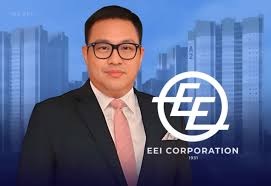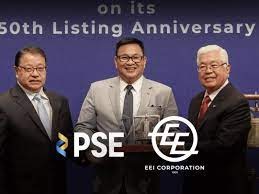MANILA, Philippines — In a bold strategic maneuver signaling a major shift in its corporate trajectory, EEI Corporation, a prominent construction and engineering firm, has successfully finalized the acquisition of the company that owns the expansive Island Cove property in Kawit, Cavite. This site is widely known as the former location of the Philippines’ largest offshore gaming operator (POGO) hub, which ceased operations following a government-mandated shutdown.
The landmark deal, detailed in a disclosure filed with the Philippine Stock Exchange (PSE) on Thursday, October 16, sees the Yuchengco-backed construction powerhouse purchase First Orient International Ventures Corporation (FOIVC) from its previous owner, KC Land Oriental Pacific Incorporated. The transaction was valued at a substantial P2.8 billion.

The Pivot: From Construction to Integrated Property Development
EEI Corporation characterized the acquisition of FOIVC as a pivotal move, integral to its long-term vision. FOIVC is defined as a domestic corporation primarily focused on the acquisition, development, sale, and leasing of real estate assets. The core value of this purchase lies in the land portfolio controlled by FOIVC, which encompasses approximately 49 hectares of land in Cavite, including the highly valuable 30-hectare Island Cove property.
This strategic investment directly supports EEI’s ambitious goal to diversify its existing portfolio. The company articulated its clear intent in the regulatory filing:
“The acquisition of FOIVC is part of the company’s long-term growth strategy to evolve from a pure-play construction company into a fully integrated property and infrastructure developer.”
For decades, EEI has been synonymous with large-scale construction and engineering projects across the Philippines and overseas. This move signifies a calculated pivot to property development, aiming to capture higher-margin real estate opportunities and leverage its extensive experience in infrastructure building to create large, mixed-use communities or industrial complexes on the newly acquired land. The company is positioning itself to be a complete end-to-end player, controlling the entire process from land acquisition and planning to construction and sales/leasing.
The Island Cove Legacy: A History of Transformation
The property at the heart of this massive deal, Island Cove, has a complex and compelling history that mirrors the changing economic landscape of the Philippines. Before its incarnation as a POGO hub, the site was a well-known, sprawling resort favored by families and tourists. It was once owned by the influential Remulla family.
According to statements made by Interior Secretary Jonvic Remulla, the family sold the property to FOIVC in 2018. It was shortly thereafter, in 2019, that the new owners repurposed the extensive grounds and facilities, transforming the erstwhile resort into what would become the country’s largest POGO hub. This rapid transformation was symptomatic of the POGO industry’s explosive, yet ultimately volatile, growth in the Philippines.
The POGO hub’s reign, however, was finite. Its operations came to an abrupt halt in November 2024 after President Ferdinand Marcos Jr. made a decisive announcement during his annual State of the Nation Address (SONA), declaring a ban on POGOs nationwide. This policy shift, driven by concerns over associated crimes, national security risks, and the industry’s strained relationship with local communities, effectively rendered the Island Cove facility obsolete for its most recent use.
The acquisition by EEI now marks the third major transformation for the property, moving it from leisure resort to controversial gaming hub, and now potentially to a site for large-scale, legitimate property and infrastructure development. The size of the land—30 hectares—offers EEI immense scope for a major flagship project that could redefine the Kawit, Cavite area.
Corporate Ownership and Political Connections: The Background
The corporate players involved in this high-value transaction have recently been the subject of significant attention due to their deep connections within the nation’s political and economic elite, adding a layer of scrutiny to EEI’s strategic moves.
The ownership structure of EEI itself underwent a recent, notable change. Leyte 1st District Representative Martin Romualdez, a highly influential political figure and former House Speaker, had previously held a 20% stake in EEI in 2023 through his family’s holding firm, RYM Business Management. However, this stake was subsequently acquired by EEI’s current chief executive officer, Henry Antonio, via a management buyout in March of the same year. This maneuver effectively returned control of the significant minority stake to company management.
Interlocking Business Relationships
Further examination of EEI’s recent corporate history reveals other connections. The year Romualdez acquired his stake also saw the appointment of Francis Lloyd Chua, the former owner of Octagon Concrete Solutions, as a director at the Yuchengco firm.
The firm Octagon Concrete Solutions is a construction company whose public works contracts experienced a significant surge in 2024. The company has drawn attention due to its partial ownership by Joseph John Quirante, who is the brother-in-law of Senate President Chiz Escudero.
While these associations are part of the public record and do not directly implicate the Island Cove acquisition in any wrongdoing, they underscore the interwoven nature of big business, major infrastructure contracts, and political influence in the Philippines. For a company like EEI, transitioning into the politically sensitive realm of property and infrastructure development, these high-level connections are a consistent feature of the operating landscape.
The Future Landscape: Real Estate and Infrastructure

EEI Corporation’s decision to commit P2.8 billion to acquire the FOIVC and the massive Cavite landholding signals a strong belief in the resilience and future growth of the Philippine real estate market, particularly outside of the congested Metro Manila center.
By shifting to an integrated developer model, EEI can capture the full profit lifecycle of a development project, from land value appreciation to construction margins and final sales revenues. The 49-hectare tract of land in Cavite is strategically located near major infrastructure projects, offering potential for high-demand residential, commercial, or logistics parks.
The redevelopment of the former Island Cove POGO hub will be a litmus test for EEI’s new strategy. It represents a symbolic reclamation of a controversial asset and its reintegration into the mainstream economy, aligning with the government’s push for legitimate, high-impact domestic investment. The market will closely watch what the construction titan ultimately plans to build on the grounds that once symbolized both a fleeting economic boom and its dramatic political demise. This acquisition is more than just a real estate transaction; it is a major realignment of a corporate giant’s identity in a post-POGO Philippine economy.





